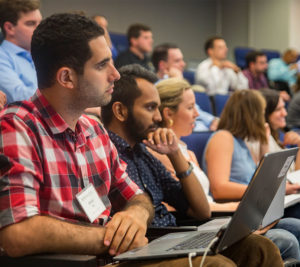By Kara Sherrer
When the earliest graduate MBA programs were founded more than 100 years ago, many applicants came straight out of college, seeking an additional business degree to round out their education. Employers eventually came to see the value of real-world experience supplementing the degree; many companies now look for MBA graduates with at least a few years of prior work experience.

The average MBA applicant has spent about five years in the workforce
Right now, the average MBA applicant has spent about five years in the workforce, which comes to an average age of 27 or 28. But this is only a mathematical average: “It’s a pretty flat bell curve,” emphasized Rob Schickler, Associate Director of Recruiting and Admissions. “While five years is the mean, we get a lot of people in the 2-4 year range and also a lot of people in that 6-8 year range. Anywhere along that part of the spectrum is appropriate.”
While the average age of a full-time MBA student at Vanderbilt Business is indeed 28, the age range extends widely in both directions. No matter where you fall on the age spectrum, we’ve outlined the benefits of getting your MBA at key stages of your career:
2-3 Years in the Workforce
More and more candidates are applying to MBA programs before they spend five years in the workforce. These younger applicants are usually hoping to move on from their first job or earn a promotion more quickly. The quality of work experience is key for younger applicants; admissions counselors are looking to see how you will contribute in the classroom and if employers will want to hire you post-MBA.
“For candidates with less years of work experience at the time of the application process, you’re going to want to show some progression (in your career so far),” explained Bailey McChesney, Senior Associate Director of MBA Admissions. “You’re going to want to show that you are somebody that takes initiative, you’ve got a strong work ethic, maybe you’ve had some some leadership experience or have shown leadership potential… Really think through ‘what have I gained so far that will help me in any function or industry post-MBA?’”
4-5 Years in the Workforce
There’s a reason that 4-5 years is the average amount of work experience for full-time MBA programs: candidates in this professional range represent the sweet spot between maintaining an openness to new ways of thinking and having deep enough work experience to contribute in the classroom and at a future employer. It’s also a good point in your timeline to use an MBA to get a title bump or switch industries. In addition, many employers are used to recruiting MBAs with this level of experience, so there are plenty of recruiting opportunities to choose from, and many of your colleagues will fall in the same range.
“For a lot of people in their 20s, the MBA is the fastest and easiest way to make a significant career transition,” Schickler said.
6-8 Years in the Workforce
Slightly older MBAs bring more work and leadership experience, from which employers and classmates benefit. Because employers are used to recruiting slightly younger MBAs, it might take some extra work to find a post-MBA job at the title and salary level befitting your extra experience. But if you’re looking to make a relatively large career change at a later stage of the game, it’s hard to beat an MBA for help making that transition.
“And if you’re staying in the same career field, an MBA is the easiest way to jump multiple levels,” McChesney said.
8+ Years in the Workforce
Full-time MBA programs can and do take applicants with more than eight years of experience, and the benefits for this group mirror those of the others (i.e., helping with transitions into a different field, getting a promotion). For example, many veterans don’t leave the military until they reach their early 30s, and many companies won’t sponsor a candidate for MBA program unless they’ve worked for the company for quite a few years.

Students who are on the more experienced end of the spectrum opt to attend an executive MBA program.
“There’s sort of a sweet spot for corporate recruiters who really like candidates in that four to six years of experience range. For people who have less than that experience, or more than that experience, it doesn’t mean that they’re not going to be successful in a job search — it just means that they might have have to present themselves in a different way or tell their story a little bit differently to show how they can add value to the organization,” Schickler said.
However, some older candidates don’t want to take two years off from work to attend business school; many students who are on the more experienced end of the spectrum opt to attend an executive MBA program while they continue working instead.
You only get your MBA once, so it’s important to apply to business school when it will give your career the biggest boost possible. There’s no universally perfect time in your life to get your MBA, so contact mentors, peers, and current MBA students to talk through your decision. If you have questions about whether you have the right experience to apply to the Vanderbilt Business MBA program, reach out to the admissions team.